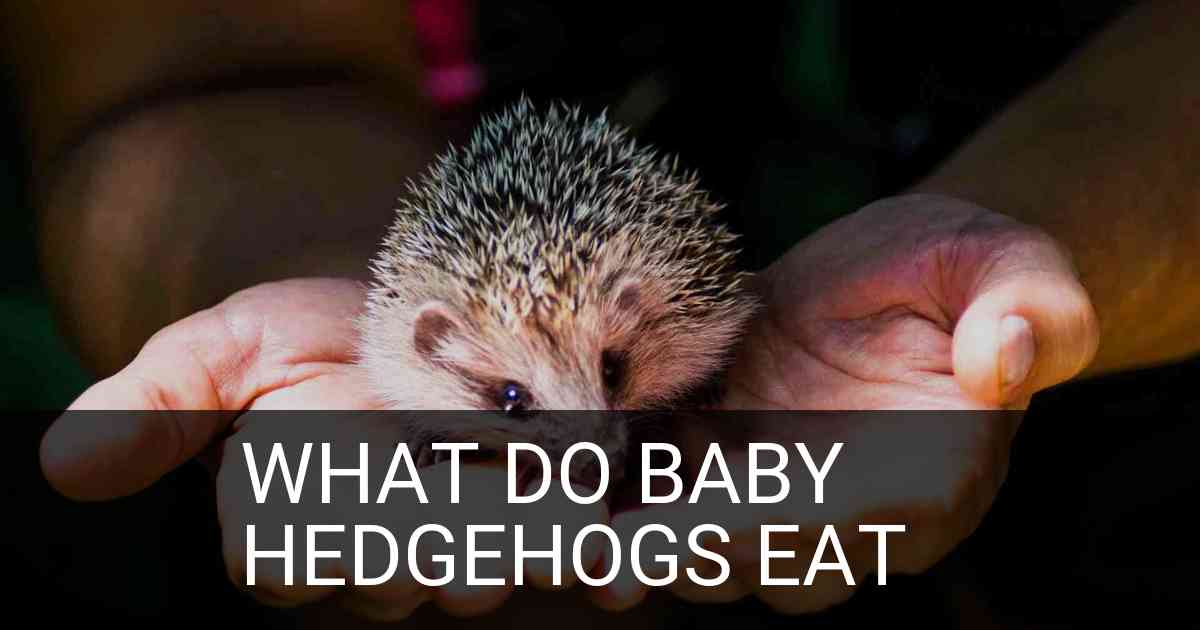
Welcome to the world of baby hedgehogs! Watching a baby hedgehog grow and develop is an incredibly rewarding experience. While they are small, they require special care and attention, including proper nutrition. In this article, we will be discussing what exactly do baby hedgehogs eat in order to stay healthy and happy. We’ll provide information on their nutritional needs, recommended foods for them, as well as tips on how to feed your little one correctly. So let’s get started!
What Do Baby Hedgehogs Eat?
Baby hedgehogs require a specially formulated diet in order to stay healthy. Generally, they should be fed a mix of high-quality dry and wet food. The dry food should consist of a commercial hedgehog diet and the wet food should include fresh fruits and vegetables as well as cooked proteins such as boiled eggs or chicken.
Recommended Foods for Baby Hedgehogs:
- Dry Food: Commercial hedgehog kibble, specifically designed for baby hedgehogs.
- Wet Food: Fruits & Vegetables – diced apples, blueberries, strawberries, carrots, peas etc.; Cooked meats – boiled eggs or chicken; Insects – mealworms or crickets.
Types of Food Suitable for Baby Hedgehogs
Feeding a baby hedgehog can be tricky as they require specific foods to ensure proper nutrition. It is important to provide food that is both safe and healthy, while also providing the necessary calories and vitamins needed for growth and development.
Insects
Insects are a major source of protein for baby hedgehogs. Commonly available insects such as mealworms, crickets, wax worms and superworms are all suitable options. Insects should not make up more than 25% of their diet though, so be sure to supplement with other sources of food.
Fruits & Vegetables
Fruits and vegetables should make up roughly 50% of a baby hedgehog’s diet. Options such as bell peppers, cucumbers, dark leafy greens (spinach or kale), berries (strawberries or blueberries) are all suitable choices. Additionally diced apples or carrots can also be offered in moderation.
Commercial Foods
Commercial diets specifically designed for baby hedgehog consumption are available on the market. These foods contain balanced levels of proteins, fats and carbohydrates which makes them an optimal choice if you’re unsure about what else to feed your pet.
Others
Additional dietary items include cooked eggs (scrambled or hard-boiled), live earthworms, cooked chicken/turkey (without seasoning) and small amounts of yogurt occasionally.
The Nutritional Requirements of Baby Hedgehogs
Hedgehogs are small, insectivorous mammals that can make great pets. While their diet in the wild consists mostly of insects and other invertebrates, captive hedgehog babies require a balanced diet to remain healthy throughout their lives.
Foods for Baby Hedgehogs
Baby hedgehogs should be fed a combination of high-quality dry and wet foods specifically designed for hedgehog diets. For example, Mazuri® Hedgehog Diet is a complete and balanced food option that provides all the essential nutrients baby hedgehogs need. This diet should make up the majority of their meals.
In addition to this dry food mix, you can offer your baby hedgehog occasional treats such as cooked eggs, lean meats (like chicken or turkey), fruits, vegetables, mealworms or crickets.
Nutrients Required by Baby Hedgehogs
- Protein: Protein is essential for proper growth and development in baby hedgehogs. The best sources of protein include bugs like mealworms and crickets as well as lean meats such as poultry or beef.
- Fat: Fat helps provide energy for growing baby hedgehogs but should be given in moderation since too much fat can lead to obesity. Good sources of healthy fats include fish oils or avocado oil.
- Fiber: Fiber helps keep baby hedgies digestive systems running smoothly. High-fiber foods like oats, bran flakes or sweet potatoes are good options.
- Vitamins & Minerals: Vitamins and minerals are important for overall health in baby hedgehogs so it’s important to ensure they get enough through their diet. Fruits and vegetables are excellent sources of vitamins A & C while seeds/nuts provide vitamin E.
Advantages of Raising an Orphaned Baby Hedgehog
Raising an orphaned baby hedgehog can be a rewarding experience for any animal lover. The deep bond that is formed between a human and their pet is something special, and with the proper care and attention, you can ensure your new pet has a long, healthy life.
Health Benefits
Raising an orphaned baby hedgehog makes sure the little critter will receive all necessary medical care from the start. This includes regular vet visits, vaccinations, deworming, flea/tick prevention and more. In addition to this, by providing them with a safe home environment they are less likely to contract illnesses or parasites from other animals.
Socialization
Hedgehogs are social creatures and enjoy interacting with humans as well as other pets. By raising an orphaned baby hedgehog in your home it gives them the opportunity to become familiar with different people, environments and situations which will help them adjust better when they’re older.
Bonding Experience
The bond between you and your pet is like no other! As you raise your adorable new friend together it allows both of you to form unique connections that only increase over time. With patience and love your hedgehog will come out of their shell eventually allowing the two of you to truly appreciate each other’s company.
Provide Security
One of the biggest advantages of raising an orphaned baby hedgehog is providing them with security. By keeping them in a safe environment where they feel comfortable they will grow up feeling secure enough to explore their surroundings without fear or hesitation.
Cost Savings
In comparison to buying adult hedgehogs from breeders or pet stores, adopting young ones may actually save money. Adopting means lower upfront costs – including supplies such as cages, bedding, food, etc. Plus, since babies require more frequent checkups at the vet than adults do – these costs may be spread out over several months vs one lump sum payment upfront.
Conclusion
In conclusion, baby hedgehogs need a specialized diet to ensure their long-term health and development. It is important for pet owners to do their research before bringing home a baby hedgehog to ensure they are able to provide the right type of food and understand how much, how often, and when to feed them. With proper nutrition, baby hedgehogs can grow into healthy adults that make wonderful pets.

